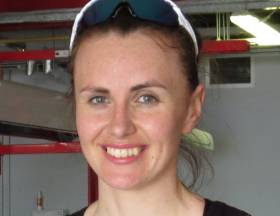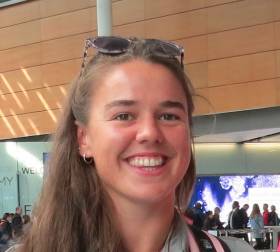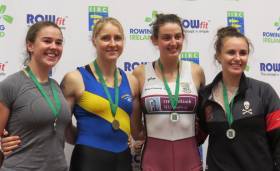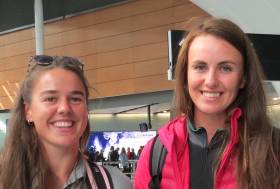Displaying items by tag: Aifric Keogh
#Rowing: Emily Hegarty and Aifric Keogh took fourth in their semi-final of the women’s pair at the World Cup Regatta in Belgrade. The two UCC women closed hard in the closing stages on Britain Two, but the British crew of Emily Ford and Emily Ashford held on to the third place which sends them to the A Final. Spain won from Denmark.
The result for the Ireland double of Monika Dukarska and Aileen Crowley was the same. They started well in their semi-final and led to the 500 metre mark. The Netherlands and Belarus One took over and held those places to the end. Belarus Two established themselves in the third qualification spot and Dukarska and Crowley, who finished fast, could not dislodge the second Belarus boat.
The Ireland pair and double will compete in B Finals.
World Cup Regatta, Belgrade, Day Two (Irish interest)
Men
Pair – C Final (Places 13 to 18): 1 Hungary 6:55.35, 2 Greece 6:57.73, 3 Ireland (M O’Donovan, S O’Driscoll) 6:59.0, 4 South Africa 7:00.22.
Women
Pair – Semi-Final Two (Three to A Final; rest to B Final): 1 Spain 7:35.18, 2 Denmark 7:35.77, 3 Britain Two 7:39.35; 4 Ireland (A Keogh, E Hegarty) 7:42.60.
Double Sculls – Semi-Final (Three to A Final; rest to B Final): Netherlands 7:16.27, 2 Belarus One 7:18.73, 3 Belarus Two 7:23.46; 4 Ireland (A Crowley, M Dukarska) 7:25.60.
Puspure Wins Single Sculls Heat in Italy
#Rowing: Sanita Puspure won her heat of the single sculls at the Memorial Paolo d’Aloja regatta in Italy, qualifying for Saturday’s A Final. The Ireland sculler had over a second to spare over second-placed Milda Valciukaite of Lithuania, an Olympic bronze medallist in the double in 2016. Emily Hegarty and Aifric Keogh qualified for the A Final of the pair with third in their heat, while Monika Dukarska and Aileen Crowley won a three-boat exhibition race in the women’s double.
Puspure Honoured as Women Produce Good Results
#Rowing: The Afloat Rower of the Month for January is Sanita Puspure. The Old Collegians competitor produced a creditable time of six minutes 39.8 seconds for 2,000 metres at the Irish Indoor Rowing Championships. Sam McKeown beat his own time to set a new record of 5:53.0 and lead the men’s rankings, while Puspure headed up a good set of performances by women. Aileen Crowley, Emily Hegarty, Aifric Keogh and Fiona Murtagh all recorded figures under seven minutes.
Rower of the Month awards: The judging panel is made up of Liam Gorman, rowing correspondent of The Irish Times and David O'Brien, Editor of Afloat magazine. Monthly awards for achievements during the year will appear on afloat.ie. Keep an eye on progress and watch our 2018 champions list grow.
Fine Showing by Keogh and Crowley Places Them Eighth in World
#Rowing: Ireland’s Aifric Keogh and Aileen Crowley took second in the B Final of the women’s pairs at the World Rowing Championships in Sarasota-Bradenton in Florida, placing this new crew eighth in the world. Both Ireland and Italy had good starts and the race developed into a battle between the two. Ireland led with a quarter of the race left, but Italy upped the rate and passed them. Keogh and Crowley came back, but could not retake the lead.
Enniskillen woman Holly Nixon stroked the British quadruple which took bronze behind the Netherlands and Poland.
World Rowing Championships, Day Seven – Irish interest
Women
Pair – B Final (Places seven to 11): 1 Italy 7:17.76, 2 Ireland (A Crowley, A Keogh) 7:19.89, 3 Serbia 7:23.75.
Quadruple – A Final: 1 Netherlands 6:16.72, 2 Poland 6:17.71, 3 Britain (4: H Nixon) 6:19.93.
Puspure Wins Battle of the Ireland Crews at Poznan
#Rowing: Sanita Puspure won the B Final of the women’s single sculls at the World Cup Regatta in Poznan today. The focus may have been on the battle between Puspure and Monika Dukarska, but Puspure’s main challenger down the course was Megan O’Leary of the United States. She finished a close-up second, with Dukarska third, 3.55 seconds behind her Ireland team-mate.
In the B Final of the women’s pair, the new crew of Aifric Keogh and Aileen Crowley started well but had to give way to the more accomplished United States crew of Kathrin Roach and Sophia Vitas, who took eighth overall.
World Cup Regatta, Poznan, Poland, Day Three (Selected results; Irish interest)
Women
Pair – B Final: 1 United States 7:22.54, 2 Ireland (A Keogh, A Crowley) 7:30.09.
Single Sculls – B Final: 1 Ireland One (S Puspure) 7:28.79, 2 United States Two (M O’Leary) 7:29.35, 3 Ireland Two (M Dukarska) 7:32.34; 4 Germany Two 7:36.36, 5 United States One 7:37.43, 6 Austria Two 7:40.21.
































































